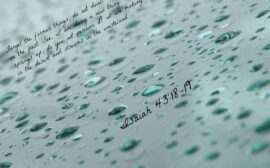By: Jerry Bogacz, PhD Candidate and Retired Biologist | December 1, 2022
What is science? In my previous essay I discussed the worldview of philosophical naturalism (also called scientific or ontological naturalism). Metaphysically, naturalism holds that everything that exists is composed of matter or emerges out of matter when it achieves a suitable complexity. Naturalism, with the assistance from the epistemological power of science, is the intellectual authority within contemporary society and strongly in the academy. The discoveries and deliveries from the investigations of physical science are the only way of gaining knowledge or, at least, that it is vastly superior to other ways knowing. Therefore, from an epistemological perspective, all that can be known is what is scientifically verifiable, and such things are the only things that count as knowledge.
Famous atheist Bertrand Russell put it this way: “Whatever knowledge is attainable, must be attained by scientific methods; and what science cannot discover mankind cannot know.”[1] This epistemology is known as scientism. However before engaging this issue of scientism, we need to consider a more fundamental question. What is science and what differentiates science from non-science. During the past two years of the Covid pandemic, public health officials and politicians claimed they were following the science. What science and from what sources were they following?
Science Is a Philosophical Reflection
When scientists (or anybody for that matter) address the questions what is science or what science does, they are engaging in philosophical reflection. The boundaries to classify science from non-science are not established by science but by philosophy, and these fascinating questions concerning definitional boundary conditions has vexed philosophers of science for the last 100 years. The debate centers around whether science is one particular thing at all. This important philosophical discussion is called the demarcation (boundary conditions) problem of science. It is the problem of distinguishing science from “pseudoscience,” metaphysics, history, religion, or other forms of thought or inquiry.
Science is Testable and Verifiable But Not Absolute
Lines of potential demarcation include but not limited to verification, falsification, testability, observability, and repeatability. One can easily separate science from nonscience when comparing physics or chemistry with palm reading and astrology; however, within these two poles of the spectrum, philosophers of science contend there is no specific criterion to demarcate science and nonscience. There is no such thing as the scientific method, but a constellation of practices and procedures used in a variety of contexts that can loosely be called scientific methodologies. These methodologies working together and used inductively do lead to a reasonable understanding of truth. However, those understandings may eventually be demonstrated to be wrong with additional research and new data. Scientific findings are not absolute but provisional and probabilistic. This wide diversity of methods has doomed attempts to find a single definition (or set of criteria) that accurately characterizes all types of science by reference to their methodological practices.
Science is Not a Singular Methodological Practice
Philosophers of science recognize the inability 1) to define science by reference to a single methodological or a set of methodological practices, and 2) to find demarcation criteria that could differentiate the scientific status of competing theories without applying a double standard or employing a question-begging fallacy. They have concluded separating science from nonscience “is both intractable and uninteresting. Instead, they have increasingly realized that the real issue is not whether a theory is “scientific” according to some abstract definition, but whether a theory is true, or supported by the evidence.”[2]
Science and Demarcation
Philosophers, the gatekeepers of science, have failed to identify the epistemic features that separate science from other sources of knowledge. Martin Eger states, “Demarcation arguments have collapsed. Philosophers of science don’t hold them anymore. They may still enjoy acceptance in the popular world, but that’s a different world.”[3] Meyer concludes, “To say that an idea, theory, concept, inference, or explanation is or isn’t scientific requires a particular definition of science. Yet, if scientists and philosophers of science cannot agree about what the scientific method is, how could they decide what does and does not qualify as science?”[4] There are no necessary and sufficient conditions that separate science nonscience from science. Philosophers are not claiming science does not exist. There is a distinction between the term’s “science” and “nonscience.” However, the distinction has no philosophical and epistemological significance. The demarcation problem continues to be addressed in the philosophy science literature.[5]
Conclusion
My next essay will look at scientism: “The theorist who maintains that science is the be-all and end-all—that what is not in science textbooks is not worth knowing—is an ideologist with a peculiar and distorted doctrine of his own. For him, science is no longer a sector of the cognitive enterprise but an all-inclusive world-view. This is the doctrine not of science but of scientism. To take this stance is not to celebrate science but to distort it.”[6]
About the Author

Jerry Bogacz was born and raised in the Chicago area. Jerry and his wife Kathy relocated to Lexington, Virginia in 2015 where they reside to this day. As a scientist, Jerry worked as a research scientist and project manager in immunodiagnostic and DNA diagnostic product development for Abbott Laboratories in northern Chicago. Jerry is a Ph.D. Candidate in the Ph.D. in Theology and Apologetics program at Liberty University. He graduated from Biola University with two degrees–an MA in in Apologetics and an MA in Science/Religion. He was a resident in 2013 at the C. S. Lewis Fellowship at the Discovery Institute. Also, Jerry received training at the CrossExamined Apologetics training in 2014. Ministerially, he served as a pastoral and teaching elder at Evanston Bible Fellowship in Evanston, IL (2001-2015). Jerry’s primary areas of research are focused around the integration of science and theology, biblical anthropology, bioethics, and worldview studies.
Notes
[1] Bertrand Russell, Religion and Science (New York: Oxford University Press, 1997), 243.
[2] Stephen Meyer, Signature in the Cell (New York, NY: HarperCollins, 2009), 432.
[3] Ibid., 433.
[4] Ibid., 401.
[5] https://press.uchicago.edu/ucp/books/book/chicago/P/bo15996988.html
[6] Nicholas Rescher, The Limits of Science (Pittsburg: University of Pittsburgh Press, 1999), 247.
Copyright, 2022. BellatorChristi.com.





